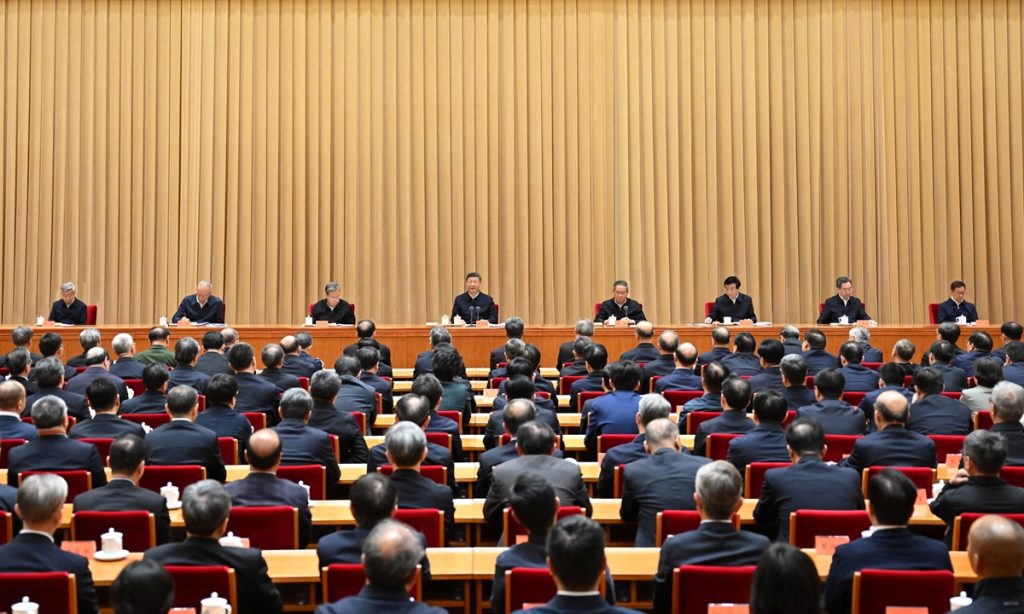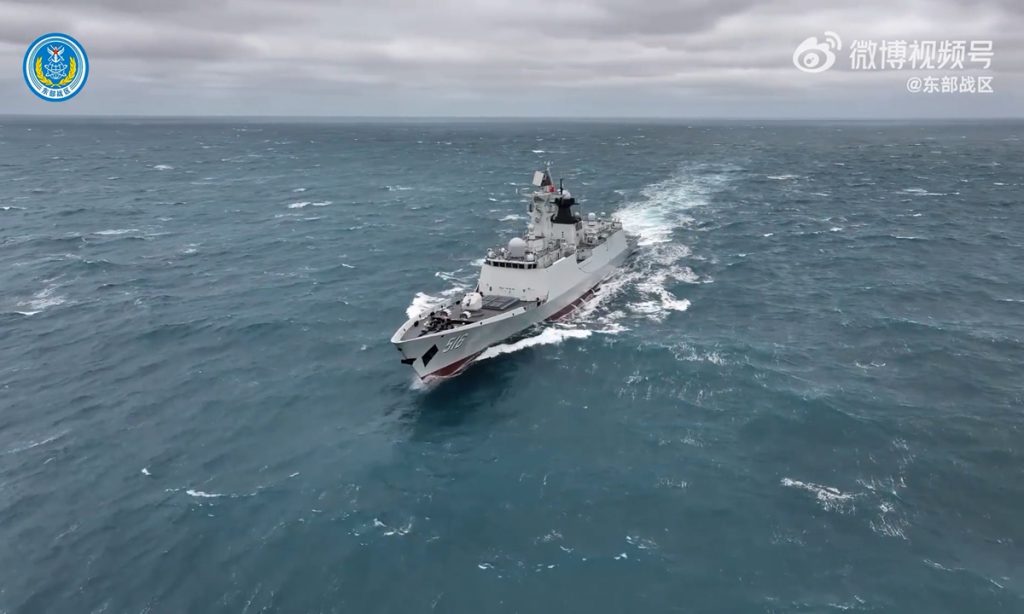Xi meets Cambodian Senate President Hun Sen
Xi meets Cambodian Senate President Hun Sen
Xi meets Cambodian Senate President Hun Sen

A villager in Southwest China's Guizhou Province suffered a fractured skull and severed arteries after being attacked by a wild boar weighing approximately 150 kilograms. Following intensive hospital treatment, the victim has regained consciousness. Local authorities have pledged to strengthen monitoring of wild boar activity in the area.
While working on his farm, 43-year-old Long from Tianzhu County heard that a wild boar was bathing by the river and, out of curiosity, he went to take a look.
Amid a crowd of onlookers, the wild boar, possibly feeling threatened, suddenly charged at the group, targeting Long.
"The boar knocked Long to the ground and viciously mauled his hands and head,” said a relative. Long’s uncle struck the boar over a dozen times with a thick club before it let go," the relative said.
The boar, weighing over 150 kilograms, inflicted severe injuries including a fractured skull and severed major arteries and veins on Long, the Paper reported, citing the relative of Long.
After the attack, Long was rushed to the hospital for emergency treatment, and the wild boar was killed, said the Paper.
Following the incident, local authorities swiftly provided emergency medical assistance and initiated wildlife compensation procedures.
An official from the township forestry station said that they have conducted an on-site investigation and subsequent reporting to the local forestry bureau, pledging to strengthen monitoring of wild boar activity.
After more than two weeks of treatment, Long regained consciousness. His family said that he is in a stable condition but remains hospitalized for further care.

Singer Tank (Lü Jianzhong), from the island of Taiwan, posted "thanks to my motherland" after he underwent a heart and liver transplant at a hospital in Hangzhou. He has recovered and been discharged, Tank said in a post on China's social media Sina Weibo on Monday.
His operation was reportedly Asia's first simultaneous heart and liver transplant for familial hypertrophic cardiomyopathy combined with liver failure, according to People's Daily on Wednesday.
Tank shared his medical journey on Weibo on Monday afternoon, noting he had largely recovered by the time of discharge. "Thanks to my motherland, thanks to Hangzhou. This is the strongest support, helping me overcome the biggest challenge of my life," he wrote. The related topic became trending with 66.19 million views.
The surgery Tank received marked Asia's first simultaneous heart-liver transplant for familial hypertrophic cardiomyopathy with liver failure. It is understood that this surgery is extremely difficult, involves complex perioperative management, and requires a high level of multidisciplinary collaboration. Only a few medical centers worldwide can perform it, according to People's Daily.
According to People's Daily, Tank rose to fame in 2006 with his debut album Fighting, which sold 100,000 copies. Hits like Three Kingdom Love and Personal Angel quickly swept through the Mandarin pop scene. However, in 2007, he suddenly fainted on stage due to his hereditary heart condition. After having a pacemaker implanted, doctors warned him that even singing loudly could be fatal, leaving Tank to step away from the stage.
By late March 2024, Tank was admitted to the Second Affiliated Hospital of Zhejiang University School of Medicine in Hangzhou, East China's Zhejiang Province, by which time his health had severely deteriorated. After a comprehensive examination, doctors found he was suffering from multiple serious conditions, including hypertrophic cardiomyopathy, decompensated cirrhosis, and heart failure, People's Daily reported.
Given the complexity of his case, hospital experts determined that a single-organ transplant would be insufficient. They unanimously concluded that only a simultaneous heart-liver transplant could resolve his condition and save his life, the report said.
After over six months of declining health, Tank finally received matching donors in November 2024. The hospital team quickly assembled and performed the simultaneous heart and liver transplant.
During the postoperative phase, the medical team navigated critical challenges such as delayed graft function, dual immunosuppressive balance, and overlapping infection risks, the People's Daily reported.

Chinese President Xi Jinping has called for building a community with a shared future with neighboring countries and striving to open new ground for China's neighborhood work, the Xinhua News Agency reported.
Xi, also general secretary of the Communist Party of China (CPC) Central Committee and chairman of the Central Military Commission, made the remarks at a central conference on work related to neighboring countries, which was held in Beijing from Tuesday to Wednesday.
In his speech, Xi systematically summarized the achievements and experience of China's neighborhood work in the new era, scientifically analyzed the current situation, and outlined the goals, tasks, ideas and measures for the next phase of neighborhood work, according to Xinhua.
While presiding over the meeting, Premier Li Qiang stressed the need to thoroughly implement the spirit of Xi's important speech and to earnestly carry out the various tasks in work related to neighboring countries, according to Xinhua.
The conference highlighted that China's vast territory and long borders make its neighborhood a vital foundation for national development and prosperity, a key front for safeguarding national security, a priority area in the country's overall diplomacy, and a crucial link in building a community with a shared future for humanity, says Xinhua.
The conference called for viewing neighboring regions through a global perspective and strengthening the sense of responsibility and mission in advancing China's neighborhood work.
Elevating role
In an article published in the People's Daily on Monday, Chinese Ambassador to Thailand Han Zhiqiang wrote that the relationship between China and Thailand is a microcosm of China's neighborhood diplomacy, and diplomacy toward Thailand is concrete practice of the principle of amity, sincerity, mutual benefit and inclusiveness of China's neighborhood diplomacy put forward by President Xi.
In today's world, the situation is complex and volatile, with unilateralism and the law of the jungle running rampant. China has enhanced friendship and deepened cooperation with the vast majority of its neighboring countries, ushering in a new era of building a community with a shared future, which fully demonstrates that Xi's important statements and practices toward neighboring countries are of great value in the current era and are even more significant for the world, wrote Han.
Since the beginning of the new era, President Xi has, by grasping the international trend and the law of regional development, creatively put forward the principle of amity, sincerity, mutual benefit and inclusiveness on neighborhood diplomacy. This has promoted the development of good-neighborly friendship, win-win cooperation and integrated co-existence between China and its neighboring countries, opening up a new situation in China's neighborhood diplomacy and ushering in a new era in the relations between China and its northwestern neighbor Central Asian countries, Han Chunlin, Chinese ambassador to Kazakhstan said in an article published by the People's Daily on Tuesday.
At the press conference on the sidelines of the two sessions on March 7, Member of the Political Bureau of the CPC Central Committee and Foreign Minister Wang Yi talked about neighborhood diplomacy.
Wang said that since the beginning of this century, Asia has maintained rapid growth, and has become a leading force for global development and a shining example of peace and stability. This has not come easily, and should be cherished with great care. Asia is where China calls home and builds its future.
To date, China has reached a common understanding on building a community with a shared future with 17 neighboring countries, in "two clusters" in the Indochina Peninsula and Central Asia respectively. In our neighborhood, we have signed Belt and Road cooperation agreements with 25 countries, and we remain the largest trading partner of 18 countries. Today's China is an anchor of stability, an engine of economic development and a pillar of regional security in Asia, Wang said.
The central conference on work related to neighboring countries was convened at a point when relations between China and neighboring countries are becoming increasingly close, with the multi-dimensional interaction intensified in economic, social and cultural aspects, Yang Xuedong, director of the Department of Political Sciences at Tsinghua University, told the Global Times.
Yang Xuedong pointed out that in particular, through platforms such as the Belt and Road Initiative, more substantial connections have been established with neighboring countries, providing a realistic basis for close ties between China and neighboring countries.
Emphasizing that relations with neighboring countries also play a vital role "for building a community with a shared future," Yang noted that to exert a positive influence on a global scale, it is first necessary to build strategic mutual trust among neighboring countries.
Jointly combat uncertainty
Currently, the world is experiencing fundamental changes unseen in a century, and various uncertainties continue to increase, said Yang Xuedong.
He noted that against this backdrop, strengthening relations with neighbors and friends can help enhance the stability and resilience of China's overall foreign strategy. Neighboring countries' peace and stability serve as the foundation for China's global diplomacy and a stable neighborhood helps China better address external challenges.
On the one hand, the external and internal environment has prompted China to strengthen its neighborhood diplomacy, on the other, in an unstable international environment, neighboring countries are seeking to deepen cooperation with China and use such cooperation to enhance their own ability to withstand risks, said Yang Xiyu, a senior research fellow at the China Institute of International Studies, told the Global Times, noting that the trend of the two sides "marching forward hand in hand" is becoming increasingly evident.
For example, most economies in Asia are affected after US government's blanket "reciprocal" tariffs came into force on Wednesday.
Minister for Foreign Affairs of Singapore Vivian Balakrishnan told the Financial Times that "Our greatest fear is that this set of announcements has shaken the foundational pillars of the world trading system right down to the core."
Balakrishnan's comments came after Prime Minister Lawrence Wong told Singaporeans in a video address last week that US tariffs marked the end of the era of globalization and free trade and the dawn of a period that would be "more arbitrary, protectionist and dangerous."
China is still recognized and valued as the most beneficial economic partner to ASEAN member states, according to a survey conducted by Jakarta-based think tanks in January, media reported.
The world's second-biggest economy gets the highest recognition in the region for its economic and development initiatives, notably through its Belt and Road Initiative, according to a survey by the Foreign Policy Community of Indonesia and the Economic Research Institute for ASEAN and East Asia.
At present, the importance of China's neighborhood diplomacy in the country's overall diplomatic strategy is rising, as the geopolitical status and global influence of the Asia-Pacific region continue to elevate, Yang Xiyu said.
Moreover, China and its neighboring countries share the joint policy objective of economic development as their core task, said Yang Xiyu, noting that driven by the trend of economic integration, the countries within the region have formed a greater demand for closer cooperation based on common interests.

The Chinese People's Liberation Army (PLA) Eastern Theater Command on Tuesday started to conduct joint exercises around Taiwan island, said a spokesperson. Military experts noted that the drills are clearly targeted, and aimed directly at the Lai Ching-te authorities and "Taiwan independence" separatist forces. They also noted that the operation is a legitimate and necessary measure to firmly safeguard China's national sovereignty, unity, and territorial integrity.
In the drills, the theater command organized its army, navy, air and rocket forces to close in on Taiwan island from multiple directions, said Senior Colonel Shi Yi, spokesperson for the theater command.
According to Shi, these drills mainly focus on sea-air combat-readiness patrols, joint seizure of comprehensive superiority, assault on maritime and ground targets, and blockade of key areas and sea lanes to test the joint operation capabilities of the troops.
On Tuesday, the PLA Eastern Theater Command organized its vessel and aircraft formations, in coordination with conventional missile troops and long-range rocket launching systems, to conduct drills of air interception, assault on maritime targets, strikes on ground objects, and joint blockade and control, in waters to the north, south, and east of Taiwan island, the PLA Eastern Theater Command said in a statement.
Zhang Chi, a professor at the National Defense University, told Global Times on Tuesday that the exercise featured sea-air combat readiness patrols, seizure of comprehensive control, anti-sea and land attacks, as well as blockade and control of key areas and routes.
These training courses have been routinely conducted in recent PLA drills near Taiwan island, including the sea-air combat readiness patrol and the Joint Sword exercises in 2023, as well as Joint Sword-2024A and Joint Sword-2024B in 2024. Zhang noted that the purpose of these exercises is to let the DPP authorities and "Taiwan independence" secessionist forces routinely feel the PLA's firm will and strong capability in defending national sovereignty and countering secessionist forces.
The exercises showed three major capabilities of the PLA, namely joint operation, precision strike on key targets, and seizure of control, according to Zhang.
The drills serve as a stern warning and forceful deterrent against "Taiwan independence" separatist forces, and are a legitimate and necessary action to safeguard China's sovereignty and national unity, Shi, the spokesperson for the PLA Eastern Theater Command, said in the Tuesday statement.
The spokesperson's statement underscored the nature of the exercise, making clear that it is directed at the Lai Ching-te authorities and "Taiwan independence" separatist forces, Zhang told Global Times on Tuesday.
Unlike Joint Sword-2024A and Joint Sword-2024B exercises, no codename was announced for the PLA exercise on Tuesday. Zhang said that, "This indicated that, from a significant extent, the PLA's exercise today has become routine. It is just like a common day for the PLA."
Shortly after the announcement of the drills on Tuesday, the PLA Eastern Theater Command's official WeChat account released a series of cartoons titled "Shell," depicting six major PLA weapons crossing the sea and encircling the Taiwan island. And it also released themed posters with one of the captions reads that "The more willful provocation, inviting greater strangulation."
Military affairs experts told the Global Times that the illustrations send a clear warning to "Taiwan independence" separatist forces that pursuing "Taiwan independence" means war and will only lead to getting oneself burned and self-destruction.
Joint moves
China Coast Guard (CCG) vessels on Tuesday also conducted law-enforcement patrols in waters around Taiwan island in accordance with the one-China principle, amid the PLA Eastern Theater Command's joint exercises around the island, according to CCG.
Zhu Anqing, spokesperson of the CCG's East China Sea Bureau, said on Tuesday that China Coast Guard vessel formations conducted law-enforcement patrols in waters surrounding Taiwan island, and carried out drills such as inspection and capture, interception and detention operations against unwarranted vessels.
A mission poster showing details of this law-enforcement operation was released simultaneously. The poster depicted that the CCG dispatched the 1107 formation, the 1303 formation, the 2304 formation as well as the vessels 2302, 2305 and 2307, which encircled the island from the north and south.
A source told the Global Times that the law-enforcement mission encircled the island, and specifically included the training courses of arresting "Taiwan independence" separatists attempting to flee via sea routes. A poster released by the CCG used a large number of elements from the popular animated film Ne Zha, making it easier for the audience to understand the Chinese mainland's sincerity in uniting the vast number of Taiwan compatriots and its determination to combat "Taiwan independence."
Also on Tuesday, the spokespersons of the Chinese Foreign Ministry and the Taiwan Affairs Office of the State Council also made statements on the joint exercises.
The drills are a serious warning and an act of containment against "Taiwan independence" separatist forces, and a legitimate and necessary move to defend national sovereignty and uphold national unity, Foreign Ministry spokesperson Guo Jiakun said at the press conference on Tuesday.
Taiwan is an inalienable part of the Chinese territory. The Taiwan question is purely China's internal affairs that brook no external interference, Guo said.
Zhu Fenglian, a spokesperson for the Taiwan Affairs Office of the State Council, said in a statement on Tuesday that the joint exercises serve as a resolute punishment against the reckless provocations of the Lai authorities in seeking "Taiwan independence."
Deterrence effect
The drills have drawn great attention from some Taiwan media and netizens on the island, and also sparked frustration against the Democratic Progressive Party (DPP) authorities over their secessionist provocations, which many believe have jeopardized cross-Straits peace and stability.
"This is not an April Fool's joke." A headline on local BCC News under the "Broadcasting Corporation of China" echoed the sentiment. In the comments section, one netizen expressed frustration against the DPP's secessionist stance, writing, "Why drag us into a crisis like this? Shouldn't leaders protect their people from war?"
Michael Chou, a Taipei-based professional, told the Global Times on Tuesday that despite it being a regular workday, the ongoing military exercises have become a hot topic of private discussion among colleagues and friends. "The DPP's actions have made Taiwan increasingly unsafe," he remarked.
Lai and the DPP authorities often attempt to conceal their underlying fears by claiming to be "unaffected" by moves of the mainland, Zhu Guilan, an expert from the Institute of Taiwan Studies under Tsinghua University, told the Global Times on Tuesday.
However, Lai has introduced the so-called "whole-of-society defense resilience" strategy and increased the "defense budget" to about 3 percent of GDP, which is clear evidence of the real deterrent effect of the PLA's exercises, said Zhu.
Zhu Guilan outlined three key significances of the military exercises, the first being that it serves as a concrete operation to safeguard China's Constitution. The second is that the exercises represent a firm implementation of the Anti-Secession Law.
Third, Zhu Guilan said the exercises underscore that, under certain circumstances, the state may adopt non-peaceful means and other necessary measures to safeguard national sovereignty and territorial integrity. It clearly defines a red line that "Taiwan independence" separatist forces must not cross, making them fully aware of the serious consequences of their actions.
Zhu Guilan also noted that the military exercises will inevitably have a strong deterrent effect on "Taiwan independence" separatist forces. The drills fully showcased the PLA's military strength and advanced capabilities, served to comprehensively test and further enhance the PLA's combat capabilities and operational readiness and reaffirmed that the PLA maintains full-time combat readiness, is prepared to fight at any moment, and is determined to prevail.
The Tuesday moves send a clear message to separatist forces that the PLA stands ready to respond swiftly and decisively to any provocation, said the expert.

The Tai'an Intermediate People's Court in East China's Shandong Province on Wednesday opened a trial of a child abduction case which dates back to 2006, when 8-month-old Jiang Jiaru was abducted from his grandparents' home. The court concluded the trial without an immediate verdict on Wednesday.
The trial concluded at around 6:30 pm on Wednesday following about nine hours of proceedings at the court.
The now-adult abduction survivor, Jiang Jiaru, attended the trial. "I will confront them in court - how many other victims did they take?" Jiang said outside the courtroom before the proceedings, The Paper reported.
Yang Niuhua, a trafficking survivor who previously confronted notorious child trafficker Yu Huaying in court, was also on-site to support Jiang and his family.
On December 4, 2006, Jiang was abducted from his grandparents' home in Shandong by three intruders who broke in during the early hours. In January 2024, four suspects, including two suspects surnamed Zeng and Lü, were apprehended by police, China Central Television reported.
Prosecutors said the defendants had kidnapped the child through violent means with intent to sell, constituting clear violations of criminal law with substantiated evidence, and should therefore be prosecuted for human trafficking crimes, according to the CCTV report.
According to China National Radio, as of January 2024, the police found Jiang in Ji'ning, Shandong. They also arrested four suspects involved in the kidnapping of the child, one of whom turned out to be their neighbor, an individual surnamed Yuan, who lived only a few hundred meters away.
Qiao Shoufen, Jiang's mother, said that they asked for severe punishment for the human traffickers, according to the report.
Jiang's Grandmother recalled that at around 1 am on December 4, 2006, the grandparents were holding their two grandsons indoors when several masked intruders burst in, the Beijing News reported. One pinned her husband to the floor, another restrained the grandmother, while a third one carried away the 8-month-old infant. The intruders fled after locking the door, and the grandmother climbed onto the rooftop screaming for help, according to the report.
Jiang's grandmother said that after the incident, her husband became very depressed, smoking five or six packs of cigarettes a day. Later, he was diagnosed with lung cancer and passed away, the Beijing News reported.
The case caught the public's attention as well. Some netizens expressed sympathy for families who have lost their children and called for harsh punishment of the human traffickers on China's X-like social media Sina Weibo.
In recent years, China has intensified its efforts to combat human trafficking. China's public security authorities solved more than 550 cases of women and child trafficking in 2024, with a group of trafficking suspects apprehended and a batch of missing and abducted women and children rescued, including a victim abducted three decades ago, according to China's Ministry of Public Security.
Whoever traffics women or children shall be sentenced to imprisonment of not less than five years but not more than 10 years and shall also be fined. Under certain circumstances, the offender shall be sentenced to imprisonment of not less than 10 years or life imprisonment, depending on the crimes, under China's Criminal Law.